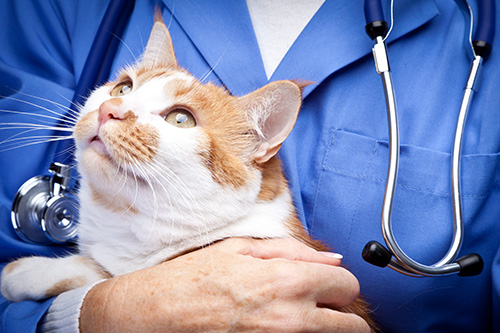CVSG is a 24 hour emergency and critical care facility, working with your regular veterinarian to provide urgent and extended care for your pet.
- Board certified specialists are available at all times for consultation and emergency surgery.
- Treatment and monitoring of post-operative and critical care patients.
- Experienced with aggressive pain management.
- Advanced diagnostics available at all times.
- On-site blood bank.
When do you call Animal ER?
- You have a concern about your pet after your veterinarian’s office has closed.
- Your pet needs advanced life support equipment such as continuous oxygen administration, ECG monitoring, drug infusion, or transfusion.
- Your pet needs continual critical-care monitoring due to the severity of his or her medical condition
- You prefer that your pet have overnight post-surgical or post-anesthetic monitoring for complications and/or pain management.
- Your pet is recovering slowly from surgery or anesthesia and your veterinarian recommends overnight monitoring for his/her safety.
- Your pet needs immediate laboratory tests performed to facilitate diagnosis and patient care.
- You would like to have an advanced diagnostic procedure such as ultrasound or endoscopy performed.
- Your pet requires a surgical procedure when your regular veterinarian is unavailable.
How to recognize an emergency…
You know your pet better than anyone. However, pets are good at hiding pain and signs of illness. Here are some signs to watch for that may indicate your pet should be seen by a veterinarian:
- A dramatic increase in respiratory rate (panting)
- Changes in gum color, from healthy pink to white, yellow, gray or purple
- Unusual changes in behavior, such as aggression or unresponsiveness, weakness or depression
- Dramatic shifts in appetite, thirst, or weight; loss of appetite
- Unusual urination or stools, can’t urinate, diarrhea
- Vomiting
- High fever
- Can’t walk
- Sudden inability to use limbs
- Visible trauma
- Bleeding
- Protracted or repeated seizure
What to do in an emergency…
- Do not panic – remain calm.
- Protect yourself from injury – pets in pain may scratch or bite. You may want to carefully wrap a large towel around your pet.
- If there is a chance of back or neck injury, carefully place the pet on a wooden board or padded ironing board and minimize movement during transportation.
- Apply direct pressure to any area with active bleeding.
- In case of possible poisoning, seek immediate treatment and bring any product packaging.
- Call your family veterinarian for advice in any possible emergency situation.
- Call Animal ER 303-794-1188 for information and instructions.
For your pet’s safety, please post our number for future reference. In some emergency situations, minutes may count. We welcome any questions concerning your pet’s health. Our experienced staff is available around the clock to assist you.

